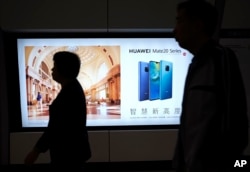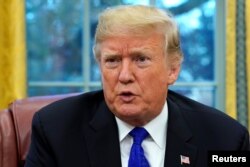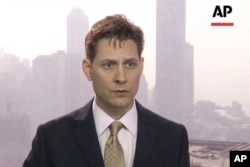A court in Canada has released tech giant Huawei's chief financial officer Meng Wanzhou on bail as she awaits possible extradition to the United States over bank fraud allegations linked to Iran sanctions.
However, in a new twist to the case that has quickly mushroomed far beyond its initial scope, U.S. President Donald Trump has said that he might intervene.
“Whatever's good for the country, I would do," Trump told Reuters in an interview, shortly after the ruling. "If I think it's good for what will certainly be the largest trade deal ever made, which is a very important thing. What's good for national security, I would certainly intervene if I thought it was necessary."
The United States has 60 days from the day of Meng’s arrest to issue a formal extradition request and provide Canadian courts with evidence. Meng, the daughter of Huawei’s founder, was taken into custody on December 1 while transiting planes in Canada.
While her legal fate is worked out, Meng agreed to post $7.5 million in bail, hand over her passports and remain in British Columbia. She will also wear an ankle bracelet and be under 24-hour surveillance, barred from leaving a home she owns in Vancouver between 11 at night and six in the morning.
Huawei Technologies is one of the world's biggest manufacturers of mobile phones. The case against Meng is not only about violations of U.S. sanctions against Iran but deep suspicions about the company and its connections to Chinese authorities, allegations Huawei has both repeatedly denied.
Suspected intel links
National security experts have raised concerns that data on Huawei devices could be made available to China’s intelligence services. The company is also a key global competitor in the ongoing race to roll out fifth generation or 5G mobile networks.
U.S. officials say Meng lied to banks about Huawei's control of Hong Kong-based Skycom — a company that allegedly sold U.S. goods to Iran in violation of U.S. sanctions against Tehran.
If convicted in the United States, she could face up to 30 years in prison. Meng maintains she is innocent and some argue that U.S. authorities have a lot to prove in their case against Meng.
Zhao Zhanling, a researcher at the Intellectual Property Center of China University of Political Science and Law, argues that the United States cannot apply its local laws to a foreign company or one of its top executives.
And that is just one of many uncertainties in the case, Zhao said.
“This is a case that is politically complicated, that has diplomatic elements and is linked to the U.S.-China trade war,” Zhao said. “And under those circumstances, whether the extradition is approved or whether the U.S. will press ahead with extradition remains to be seen.”
Trump intervention
Zhao believes there’s a good chance that Washington will give up the extradition request in exchange for a better trade deal with China.
At a regular briefing Wednesday, China Foreign Ministry spokesman Lu Kang said Meng’s arrest was a mistake from the “start,” but welcomed Trump’s remarks.
“Any person, especially if it is a leader of the United States or a high-level figure who is willing to make positive efforts to push this situation in the right direction, then that of course, deserves to be well received,” Lu said.
Julian Ku, a professor of law at Hofstra University in New York, said that while President Trump can instruct the attorney general to withdraw an extradition request, “it doesn’t sound like he has been fully briefed on the charges against Meng and its legal basis.”
That or the “complexities of making these comments during an extradition proceeding,” he adds.
For now, Ku said it is his impression that Trump does not have any plans to act one way or the other, just that he didn’t want to rule anything out.
China has argued that the case against Meng is politically motivated and the president’s comments will go a long way to bolstering that view. Some analysts also worry that it sets a dangerous precedent, putting Americans at risk and undercutting rule of law.
Beijing retaliation likely
China has already lashed out at both Canada and the United States over her arrest, warning Ottawa of severe consequences. There are already signs that both governments may be preparing to issue travel warnings to their citizens traveling to China.
And analysts have said retaliation from Beijing is likely.
Just prior to Meng’s final day in court, Canada confirmed Chinese authorities have detained Canadian Michael Kovrig, a former diplomat who is currently a senior adviser at the International Crisis Group.
The Canadian government voiced its “deep concern” but said it sees no explicit connection between Kovrig's arrest and the Meng case.
Others disagree.
"We are doing everything possible to secure additional information on Michael's whereabouts as well as his prompt and safe release," the group said in an earlier statement.
On Wednesday, China's Foreign Ministry spokesman Lu Kang suggested Kovrig’s employer is not properly registered as a non-governmental organization in China.
"If they are not registered and their workers are in China undertaking activities, then that's already outside of, and breaking, the law, revised just last year, on the management of overseas non-governmental organizations operating in China,” Lu said.
ICG could not be reached for further comment.







